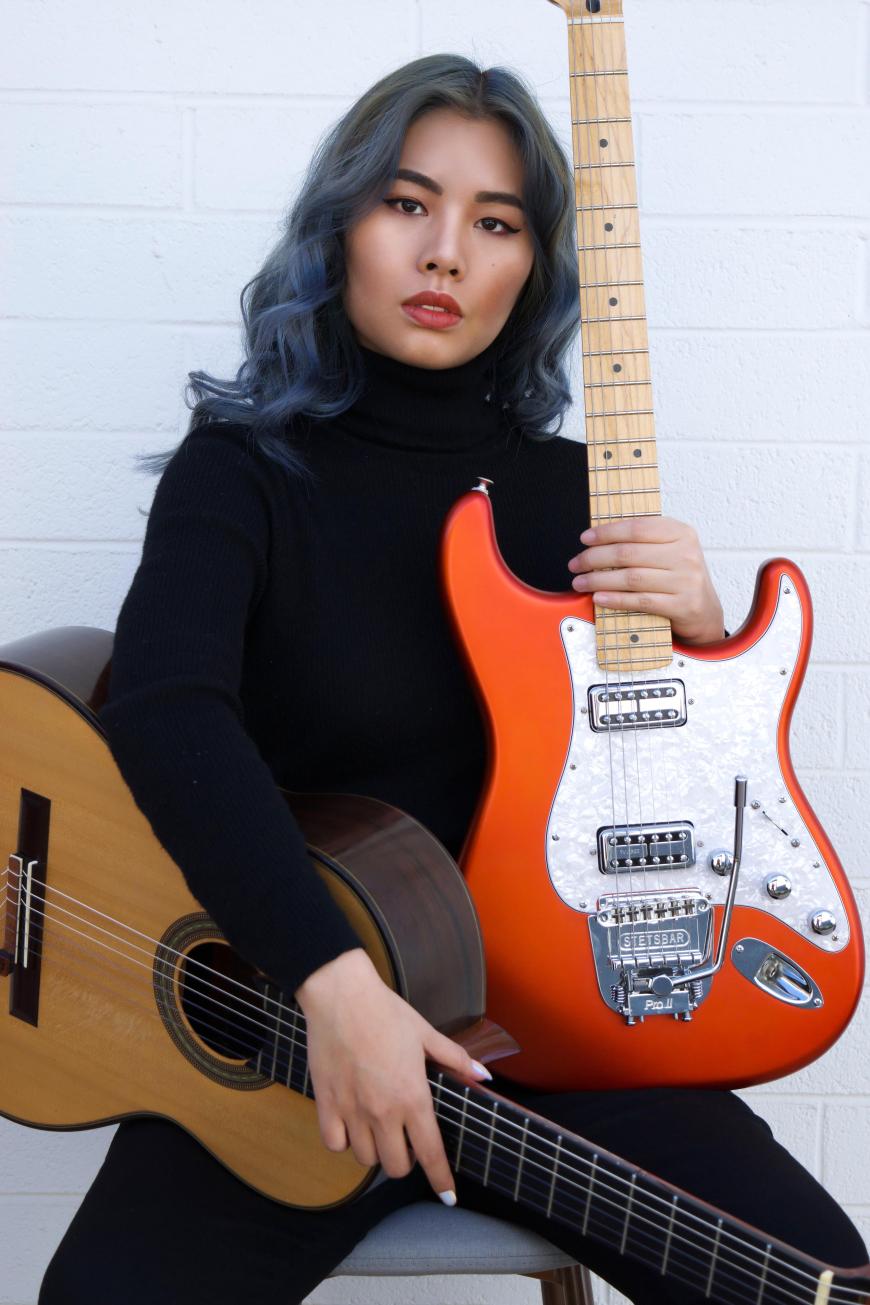
An engaging and creative 30-year-old, Jiji is a breath of fresh air in the world of the classical guitar. The first mononymous guitarist since Segovia, she has quite a pedigree, with degrees from the Curtis Institute and the Yale School of Music, a first prize in Concert Artists Guild’s international competition, and appearances with established groups like Cuarteto Latinoamericano, Eighth Blackbird, and Wild Up. But it’s her fresh approach to repertoire and her ebullient personality that make her notable.
Jiji’s recital on Saturday at Herbst Theatre, sponsored by San Francisco Performances and the Omni Foundation, was what she called a “live mixtape” and featured music by a nun who lived in 17th-century Italy, a 20th-century Haitian American guitarist/composer who recorded for Smithsonian Folkways and collaborated with Harry Belafonte, Jiji’s contemporaries who have dedicated pieces to her, her own compositions for electric guitar, and several exquisitely performed works from the traditional classical guitar repertoire.
Claudia Sessa was an Italian composer, singer, and instrumentalist who wrote two sacred pieces published in 1613, which were praised for their “recitative style.” Occhi io vissi di voi (Eyes, I have been sustained by you) was written for solo voice and basso continuo and skillfully arranged for solo guitar by Jiji, who performed with exquisite sensitivity to the style of Baroque improvisation.
Next, Jiji presented her homage to 20th-century pop music. The connecting thread through it all was guitarist/composer Frantz Casseus, who immigrated to the United States from Haiti in 1946. Influenced by both classical music and American jazz, Casseus also strove to convey the spirit of Haitian traditional music. His “Yanvalloux” take its name from a traditional Afro-Haitian dance associated with voodoo rituals and Haitian folklore. “On Sunday” is another dance of his in an easygoing, relaxed mood. And “Merci Bon Dieu” is a passionate song of praise that Casseus recorded with Belafonte. Jiji’s sensuously swaying interpretations perfectly captured the rhythms of each piece. The music of Casseus was complemented and contrasted in this set by a lovely arrangement of Harold Arlen’s “Over the Rainbow” and an exciting rendition of Roland Dyens’s “Tango en Skaï.”
Jiji played “Asturias” by Isaac Albéniz, from his Suite española, Op. 47, with a strikingly dramatic outer section and an introspective Moorish middle section. Niccolò Paganini’s Caprice No. 24 in A Minor was clean, crisp, and amazing.

The second half of the concert was entirely contemporary music, and it was an example of the “guts and guile” that Elizabeth Taylor, the iconic 20th-century film star, felt were necessary to make a personal and unique artistic statement. Michael Gilbertson, a faculty member at the San Francisco Conservatory of Music and composer-in-residence with the San Francisco Chamber Orchestra, contributed the aptly titled Guts and Guile, a work full of striking harmony and drama, dedicated to Jiji, which she played with great flair.
Another dedicated piece, Krists Auznieks’s Cor, was a strikingly virtuosic work, which Jiji told the audience caused her a great deal of trouble to master. The result was stunning. Jiji’s virtuosic guitar was at first subtly enhanced by computer music, which gradually became more and more active until it took over the piece entirely and the live guitar was silent. She played it with the poise of a Zen master and was able to enter first naturally and later strikingly as the music reversed the process.
Steve Reich’s Electric Counterpoint, written for solo guitar accompanied by a backing track of 10 guitars and two bass guitars, is an excellent example of Reich’s rhythmically complex and viscerally exciting style and was a delight to see performed live.
In both solo works and pieces accompanied by electronics, Jiji played a magnificent Gernot Wagner guitar — until the finale, when she switched to a Stratocaster electric for two of her own compositions. Everyone Wants a Piece of You and For Patty were atmospheric and textural works that used the many effects the electric instrument makes possible and added a delightful variety to the program.



